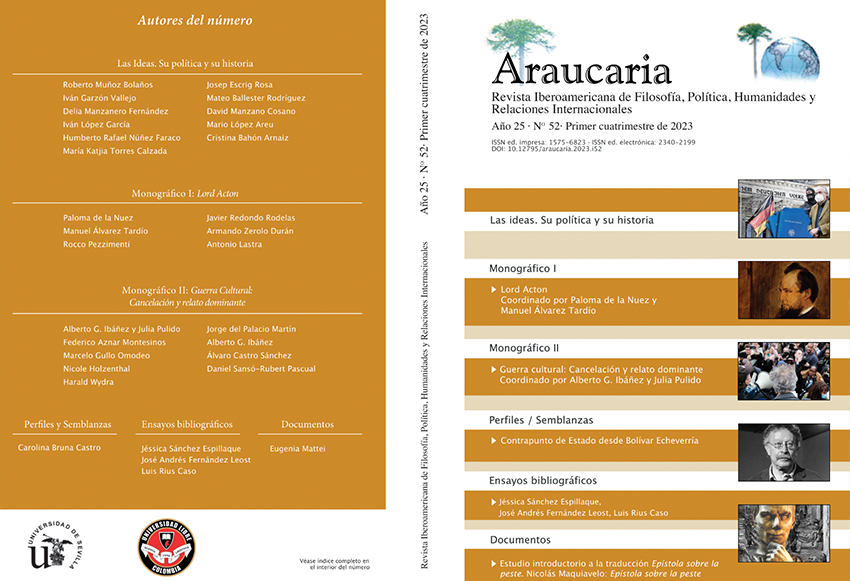Lord Acton, Juez e historiador de las ideas
Lord Acton, The Judge and Historian of Ideas
DOI:
https://doi.org/10.12795/araucaria.2023.i52.12Parole chiave:
Historia, religion, ideas, libertad, juezAbstract
Los liberales de todas las épocas han concedido siempre una gran importancia a las ideas en la historia y, en ese sentido, Lord Acton no es ninguna excepción. Al contrario, defendió en sus escritos que las ideas son fuerzas históricas muy poderosas que mueven el mundo. Son las causas de los sucesos políticos y que, entre todas ellas, la más importante es la idea de libertad. Una idea moral entendida como libertad de conciencia de la que nacen todas las demás.
Precisamente, por el reconocimiento del protagonismo de las ideas en las sociedades humanas, se le considera hoy en día uno de los mayores exponentes de la disciplina Historia de las ideas políticas. Sin embargo, encontramos en el pensamiento histórico de Acton una serie de afirmaciones polémicas y contradictorias. Reconoce la imperfección de nuestro conocimiento, la complejidad de la historia y de las ideas que contribuyen a explicarla, a la vez que hace del historiador un juez inflexible, objetivo e imparcial que ha de juzgar, no sólo los hechos históricos y las ideas que los provocaron, sino también a los historiadores que los narraron.
Downloads
Riferimenti bibliografici
Bibliografía citada:
J. Burrow, Historia de las historias. De Heródoto al siglo XX (Barcelona, 2009).
R. C. Collingwood, Idea de la historia, Fondo de cultura económica (México, 1996).
G. Himmelfarb, Lord Acton. A study in Conscience and Politics (San Francisco, 1993).
R. Hill, Lord Acton (New Haven, 2000).
D. Negro Pavón, “Historia de las ideas”, en Enciclopedia de las ciencias morales y políticas, pp. 284-289 (Madrid, 2020).
P. de la Nuez, “Presentación” (Madrid, 2020).
R. Pezzimenti, The Political Thought of Lord Acton. The English Catholics in the Nineteenth Century (Herefordshere, 2001).
H. Tullock, Acton. Historian on historians (Londres, 1988).
##submission.downloads##
Pubblicato
Come citare
Fascicolo
Sezione
Licenza
Las ediciones impresa y electrónica de esta Revista son editadas por el Secretariado de Publicaciones de la Universidad de Sevilla, siendo necesario citar la procedencia en cualquier reproducción parcial o total.Salvo indicación contraria, todos los contenidos de la edición electrónica se distribuyen bajo una licencia de uso y distribución “Creative Commons Atribución-NoComercial-SinDerivar 4.0 Internacional”








